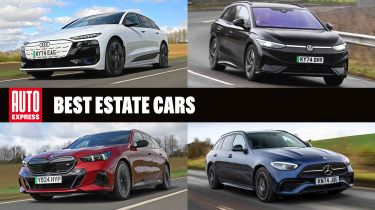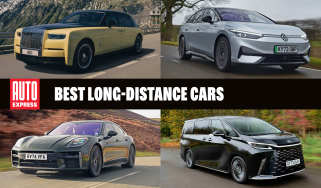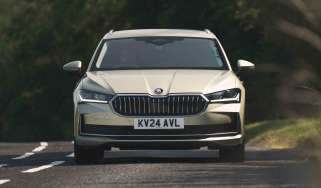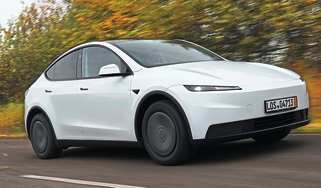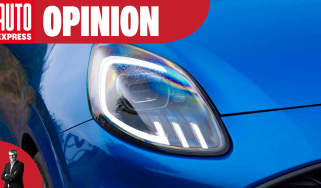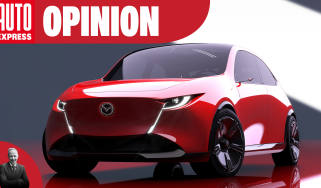Best estate cars to buy 2025
A good estate car delivers practicality and low running costs - here are the 10 best estates on sale in the UK today
They might be less popular than they once were, but the best estate cars are still hugely spacious family-focused models that offer plenty of practicality. These cars are often very good to drive, too, and there’s now plenty of choice when it comes to fuel, with petrol, diesel, hybrid, plug-in hybrid and fully electric estates all up for grabs.
Our expert road testers have driven all of the estate cars that you can buy in the UK, and have carefully evaluated every crucial factor including space, fuel efficiency, on-board technology, comfort and the purchase price.
Whether you want carrying capacity, style, dog-friendliness, towing ability, performance or simply a great all-rounder, you’ll find an ideal choice among the top 10 best estate cars you can buy right here.
Compare the best estate cars
| Best estate car ranking | Model | Price from | Overall Auto Express star rating (out of 5) |
| 1 | Skoda Superb Estate | £37,200 | 4.5 |
| 2 | Toyota Corolla Touring Sports | £32,100 | 4 |
| 3 | Audi A6 Avant e-tron | £65,100 | 4.5 |
| 4 | Volkswagen Passat | £40,000 | 4 |
| 5 | BMW 5 Series Touring | £54,500 | 5 |
| 6 | Mercedes E-Class Estate | £59,700 | 4 |
| 7 | BMW 3 Series Touring | £43,900 | 4.5 |
| 8 | Mercedes C-Class Estate | £47,900 | 4 |
| 9 | Volkswagen ID.7 Tourer | £51,000 | 4 |
| 10 | Audi A6 Avant | £53,300 | 4 |
Scroll down for more information on each of the best estate cars, or simply click the links in the table above
1. Skoda Superb Estate
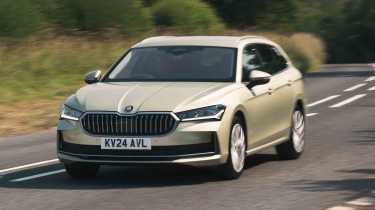
Pros |
Cons |
|
|
- Prices from £37,200
The Skoda Superb Estate could well be considered the quintessential estate car, because it features the elements that buyers in this class need without compromising what they want.
The main selling point of the Skoda Superb is its unrivalled practicality. The boot provides a cavernous 690-litre load area (increasing to 1,920 litres with the seats down), and these are figures that few rivals come close to matching. It’s a very similar story for passengers, too, as there’s enough head and leg room in both the front and rear for even the very tallest of occupants to stretch out and relax.
This kind of space makes the Superb feel surprisingly luxurious, and this is also reflected in the level of quality and kit on offer. Plenty of the Skoda’s cabin materials would be perfectly at home in a much pricier Audi model, but the brand’s ‘Simply Clever’ touches (including the famous door-mounted umbrella) only add to the appeal.
Buyers have the choice of petrol, diesel or plug-in hybrid power, and every powertrain provides enough shove for stress-free motorway runs. Naturally, the Superb’s luxury ambitions are backed up by a smooth ride and plenty of sound-deadening. The plug-in hybrid also features an excellent all-electric range and has little compromise in terms of boot space, but it’s also a little more expensive to buy than you might expect of a Skoda.
If there's one criticism, it’s that the sheer size of the Superb Estate made it a bit tricky to park during our testing. Aside from that tiny gripe, though, this car has been the obvious candidate for our Estate Car of the Year award in 2024 and 2025.
“To our eyes, the Skoda Superb's sculpted bodywork could easily pass for something with an Audi or Mercedes badge on it.” - Ellis Hyde, news reporter
Latest Skoda Superb Estate deals
2. Toyota Corolla Touring Sports
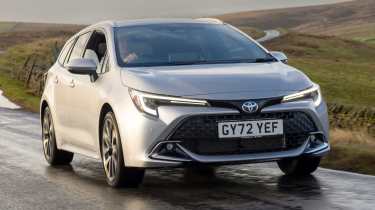
- Prices from £32,100
Pros |
Cons |
|
|
The Toyota Corolla Touring Sports has a set of traits that might not seem a perfect fit in this list. The boot is smaller and less versatile than many rivals’, and there’s no tax-friendly plug-in hybrid model. However, for many estate buyers, the Corolla offers a compelling package built on its peerless reliability and hybrid efficiency.
Inside, the boot capacity varies depending on your chosen engine size – 596 litres for the 1.8-litre unit or 581 litres for the 2.0-litre model – but the load area is well laid out with a low load lip. There’s also good space in the second row, and the touchscreen is now a decent size and connects to Apple CarPlay and Android Auto.
The Corolla is a tad deceptive in its reputation and appearance, too, as its generally sensible ethos and conventional bodywork hide a surprisingly enjoyable driving experience. Our road testers were particularly impressed with the Toyota’s handling and steering, and we reckon it’s more fun to drive than the Volkswagen Golf Estate. As with many other modern Toyotas, the latest Corolla is available exclusively in hybrid form. There are two petrol hybrid powertrain options; a 1.8- or 2.0-litre, and both can achieve over 60mpg with very little effort. Yet with 138 and 193bhp respectively, they also offer decent performance.
One of the Corolla’s biggest weaknesses used to be its infotainment system, which was dated and sluggish compared to several of its rivals. Thankfully, Toyota addressed this by installing an upgraded system with a larger and more responsive 10.25-inch screen as part of a facelift.
“The TNGA underpinnings feel sophisticated, as it allows for a great balance between ride comfort and body control.” - Ellis Hyde, news reporter
Latest Toyota Corolla Touring Sports deals
3. Audi A6 Avant e-tron
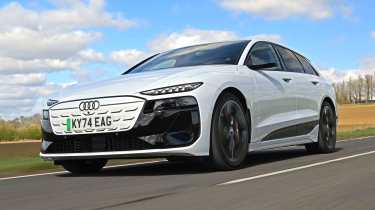
- Prices from £65,100
Pros |
Cons |
|
|
Don’t let the name fool you, the Audi A6 Avant e-tron isn’t related to the Audi A6 Avant that you’ll find further down this list. Confusing naming strategy aside, though, this is one of the best electric estates you can buy.
While its 502-litre boot and cabin space are fairly average compared to rivals, there’s no denying how supremely comfortable the A6 e-tron is. The lack of a combustion engine keeps things nice and quiet, while fitting the optional air suspension helps to alleviate the effects of Britain’s poorest tarmac.
As with many executive cars, the Audi A6 Avant e-tron’s interior is dominated by screens, but our road testers found the software easy to fathom and operate with minimal practice. The majority of materials surrounding these screens are of a very good quality too, if not quite as nice as those found in the BMW i5.
Of course, the biggest draw for buying an EV is savings, and company car drivers can enjoy that delightful three per cent Benefit-in-Kind tax rate. The fact that every variant of the A6 Avant e-tron can cover well over 300 miles on a single charge means you shouldn’t find yourself forking out a fortune on top-ups, either.
“On the road, the A6 e-tron’s shove doesn’t feel dramatic; without the flare of noise and gearshifts we’re used to in fast Audi estates, the feeling here is a silent, relentless surge.” - Alex Ingram, chief reviewer.
The electric estate market is a fledgling one, but the Volkswagen ID.7 Tourer and BMW i5 Touring are two other premium, zero-emission wagons that are worthy of your attention
Latest Audi A6 Avant e-tron deals
4. Volkswagen Passat
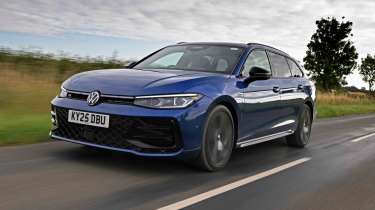
Prices from £40,000
Pros |
Cons |
|
|
If you’re a fan of the Skoda Superb Estate, you’ll probably have lots of time for the latest Volkswagen Passat, because under the skin they are similar. Where they do differ is in what engine options are available. Either way, if you’re interested in going hybrid, there’s still a great deal to like about VW’s classic estate.
There is one area where the Passat does stand out though; practicality. Being based on the Skoda Superb Estate means the VW manages to outshine most of the competition when it comes to its 690-litre boot. On top of all this luggage capacity, there’s also a huge amount of space for every occupant.
Much like its sister car, the Passat’s overall quality has taken a big step upwards and it now feels like a fully-fledged executive estate. Sadly, though, this car doesn’t have physical controls like the Skoda, and touchscreen sub-menus can quickly become frustrating. Aside from this drawback, though, it’s still a very pleasant place to be and there’s plenty of useful kit thrown in as standard.
There’s also no diesel power to be found here, but you do get the choice of petrol or plug-in hybrid models. The latter option offers more than 80 miles of pure-electric range on the WLTP combined cycle, and this can result in some serious savings on running costs. No Passat is about to set the world on fire with its performance or driver engagement, but we did find it just as comfortable and refined on long trips as its Skoda sibling.
“The steering remains well-weighted and accurate, and while there’s not much feel, it makes the Passat easy to place on the road.” - Jordan Katsianis, senior staff writer
Latest Volkswagen Passat deals
5. BMW 5 Series Touring
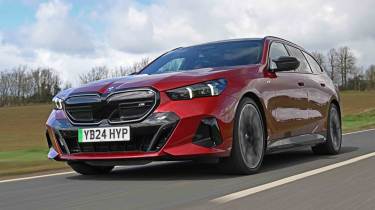
- Prices from £54,500
Pros |
Cons |
|
|
The BMW 5 Series Touring offers a traditional combination of superb comfort, engaging driving dynamics and a generous boot – as the model has historically done for generations.
This latest 5 Series Touring gets a very useful 570-litre boot, which is easy to fill up thanks to its low loading lip. The amount of passenger space is nearly on a par with that in the luxurious BMW 7 Series, too. In other words, there’s plenty of it.
Being a BMW, the 5 Series Touring is certainly one of the more engaging cars to appear on this list. The Bavarian brand’s efforts mean that the Touring doesn’t feel as large as it actually is on the road, and this combined with direct steering makes this large estate car feel surprisingly agile in corners. If you’re in a rush, the most powerful variants can cover the 0-62mph dash in under four seconds.
When it comes to power, there’s the choice of petrol or plug-in hybrid, or you can opt for the fully electric BMW i5 Touring. The latter is the best choice for company car drivers because it attracts the lowest Benefit-in-Kind tax rate, not to mention further savings on running costs. The least powerful, petrol-powered 520i is the cheapest 5 Series to buy, but it still offers enough performance to live up to its badge.
“The standard 5 Series, and in particular the Touring, has the almost unique ability to be all things to all people.” - Richard Ingram, deputy editor
Latest BMW 5 Series Touring deals
6. Mercedes E-Class Estate
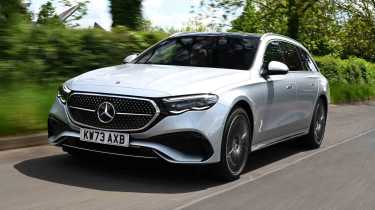
Pros |
Cons |
|
|
- Prices from £59,700
The Mercedes E-Class Estate has typically been more spacious and comfortable than its BMW 5 Series rival, and for the most part this still applies.
There’s plenty of bells and whistles, but these do take up their fair share of space. This means the E-Class Estate’s cabin does feel a bit more compact compared to some of its rivals, and this may be a bit surprising when considering the Merc’s overall size.
It’s still a very pleasant place to sit, it’s just that space for bigger passengers to stretch out is rather limited for an executive estate car. Luggage space depends on your chosen powertrain, and the petrol and diesel variants are the most capacious with 615 litres of boot space.
Step inside the E-Class and the dashboard will probably be the first thing that catches your eye. A 14.4-inch central screen and two 12.3-inch displays make up Mercedes’ Superscreen set-up. It’s not quite as information-packed as the even more impressive Hyperscreen option, but there’s still plenty of data to get your head around.
The techfest continues underneath the bonnet, too, where you have the choice of the aforementioned petrol and diesel, a petrol plug-in hybrid or even a diesel plug-in hybrid, which is a very rare sight on today’s market. The latter claims up to 565mpg on the WLTP combined cycle, but in typical PHEV fashion you’ll struggle to achieve this in the real world. Much like its larger sibling, the Mercedes S-Class, the E-class is exquisitely comfortable and refined, but this relaxation does come at the cost of driving fun.
“The Mercedes E-Class Estate is incredibly quiet at low speeds, especially the hybrid models that can drive using near-silent electric power without waking the engine.” - James Disdale, Auto Express contributor
Latest Mercedes E-Class Estate deals
7. BMW 3 Series Touring
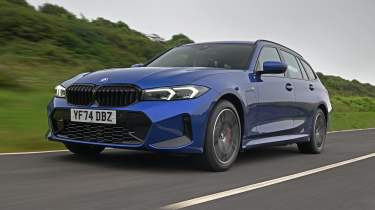
Pros |
Cons |
|
|
- Prices from £43,900
Much like the larger 5 Series, the BMW 3 Series Touring offers practicality and sportiness in equal measure.
In order to keep up the fight against Audi and Mercedes, BMW’s engineers paid closer attention to rear cabin space in the latest generation 3-Series, so it’s now much more convincing as a family car. Of course, front passengers can get nicely settled, too, and there’s plenty of adjustment to help them find the ideal seating position. At the back resides a 500-litre boot which isn’t the biggest in the class, but this should still prove plentiful for an impromptu week away.
Although some rivals have the Touring beaten on load capacity, very few of them deliver the same driving experience that the BMW boasts. The price for genuine sporting credentials is a slightly firmer ride than the likes of the Mercedes C-Class, but the BMW is still pleasingly refined in the majority of situations — only when it’s fully laden can the worst road surfaces manage to upset the ride.
Inside, the BMW’s cabin is beautifully built, and more recent models feature the brand’s iDrive 8 infotainment software, which centres around a curved pair of display panels on the dashboard. As well as being a touchscreen, the 14.9-inch infotainment screen can be operated by a traditional rotary dial, making it one of the more intuitive systems on the market.
“The 3 Series lives up to the driver appeal expected of the model with excellent poise and agility. But like its rivals, it does suffer from having slightly lifeless steering.” - Shane Wilkinson, senior content editor
Latest BMW 3 Series Touring deals
8. Mercedes C-Class Estate
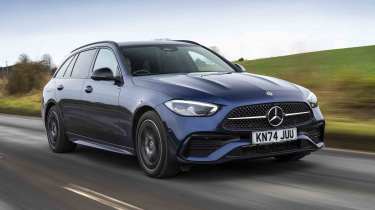
Pros |
Cons |
|
|
- Prices from £47,900
With its hi-tech cabin, wide range of powertrains and slick road manners, the Mercedes C-Class Estate is among the best of its kind.
That said, at 490 litres, the boot is fairly compact when compared with most on this list, and is compromised further in the plug-in hybrid models. However, the cabin is by far one of the most luxurious you’ll find in a car within this price bracket, with enough space for four adults to sit with room to spare. There are some useful storage solutions to be found, too, and we even managed to store a small bag in the large centre armrest.
Traditionally, the BMW 3 Series has edged out the C-Class for outright driving enjoyment, and this trend continues with the latest generation of each. However, while the BMW is more agile through a series of bends, the Mercedes has an appeal of its own with a supple, cosseting ride and a relaxed demeanour. Opting for PHEV power also brings up to 67 miles of silent, pure electric driving.
The C-Class’s cabin feels strikingly modern, too, with an enormous portrait touchscreen that rises up from the centre console and runs the firm's MBUX software. Swathes of ambient lighting and intricate detailing help to bring the Mercedes more up to par with the refreshed BMW 3 Series.
“The C-Class Estate driving experience matches the saloon, which is to say it rides beautifully and has just enough dynamism to entertain.” - Alastair Crooks, senior news reporter
Latest Mercedes C-Class Estate deals
9. Volkswagen ID.7 Tourer
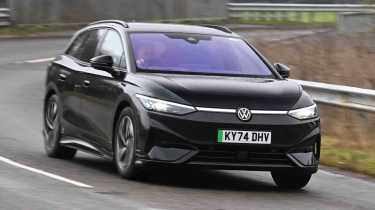
Pros |
Cons |
|
|
- Prices from £51,000
The electric executive car market has so far been a tough one for most car makers to crack, but the Volkswagen ID.7 offers an intriguing new option in the form of a more practical, and many might say more attractive, estate model.
With 565 litres of boot space, the Volkswagen ID.7 Tourer falls short of the combustion-powered VW Passat’s 690 litres, but it does still have a luggage-lugging edge over the Tesla Model 3, BYD Seal and Hyundai Ioniq 6 — all of which are exclusively available in hatchback or saloon forms. The ID.7 has solid family car credentials, too, with ISOFIX points in the front and back, even for the rear middle seat.
For those who cover long distances on a regular basis, the ID.7 comes with the choice of a 77kWh or 86kWh battery pack, returning up to 373 and 424 miles of claimed range respectively. This means even the smaller battery provides more than enough for just about every daily need. When you do run out of juice, you can top up the ID.7 Tourer from 10 to 80 per cent in around 28 minutes, thanks to its 175kW peak DC charging rate.
As is typical with executive EVs, there’s no shortage of tech to be found within the ID.7 Tourer. We’re pleased to report that VW has made efforts to improve the functionality of its touchscreen tech, but the brand’s reluctance to include physical buttons is still a bit of a bugbear. The materials used here are also a step up from VW’s other electric offerings.
“Given that the ID.7 Tourer is designed to cover long distances, you’ll be pleased to find it can happily cope with town driving.” - Max Adams, online reviews editor
Latest Volkswagen ID.7 Tourer deals
10. Audi A6 Avant
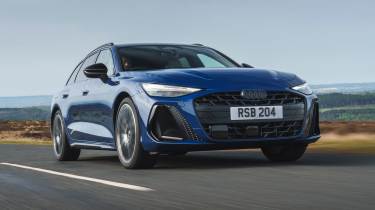
- Prices from £53,300
Pros |
Cons |
|
|
The all-new generation Audi A6 Avant offers plenty of style and luxury, but doesn’t quite hit the same high notes that made previous models so compelling. Still, this is a hi-tech and very sleek offering that stands out from its key rivals.
Space inside is good, if not great, for the class, and while the boot is wide and low, its 503-litre capacity isn’t quite the best in class; although the PHEV version doesn’t have the same annoying hump in the floor as some rivals’. This smaller boot is a consequence of the latest A6’s rakish design, but there is ample space for passengers in both the front and rear.
Comfort is brilliant, and the A6 now drives with pleasing agility and accuracy, feeling more connected than a BMW 5 Series or Mercedes E-Class. Buyers can choose from petrol, diesel or plug-in hybrid power.
Audi has a pretty stellar reputation for its interiors, but the latest A6 does suffer from a few cheaper-feeling materials here and there. Build quality is still very strong overall, though, and there’s a tonne of tech to sink your teeth into.
“The A6’s soft suspension and firm steering made for an extremely comfortable ride without the car feeling nervous or twitchy. The exceptional refinement from both road noise and powertrain drone improves matters further.” - Jordan Katsianis, senior staff writer.
How to choose the best estate car
The estate car used to be the bastion of total sensibility, prioritising practicality and boot space above style or image. But nowadays, it’s SUVs that rule the roost for the vast majority of new car buyers due to their more versatile cabins and trendier image. While the increasing popularity of SUVs could therefore have put the estate genre of car out to pasture, this has hardly been the case.
That’s because as real car enthusiasts know, there’s almost no compromise when it comes to an estate car in terms of efficiency, driving dynamics or cost of ownership – something you can’t always say about an SUV.
This is especially true in 2025, because it’s efficiency, in particular, which is now put under the microscope for most buyers as the cost of living continues to go up.
Modern estates are some of the most efficient new cars on sale, thanks to their low-profile shape, and their versatile range of petrol, plug-in hybrid and all-electric powertrains.
Those after a more engaging driving experience will also be happy, because a traditional estate has little in the way of compromise when it comes to driving dynamics. This means that many of our favourite family haulers can still be punted down a twisty road with poise and control, and a few even offer supercar-like performance and driving thrills.
Our expert road testers have driven all the estate cars that you can buy in the UK, carefully evaluating every crucial factor, including the space available, fuel efficiency, on-board technology, comfort and the purchase price.
Here are some of the key questions you should ask yourself when choosing an estate car to help you get the best model for your needs...
How much luggage space do you need?
Don’t assume all estates are born equal. Luggage capacity ranges from the relatively small Mercedes E-Class Estate PHEV with 460 litres, to the colossal Skoda Superb with 690 litres – naturally these numbers change significantly with the seats folded.
How much towing capacity do you need?
Towing capacity can vary greatly from estate to estate as well. The Skoda Superb is among the best performing estates with a maximum braked towing capacity of up to 2,200kg. Should you require slightly less grunt, the BMW 3 Series Touring offers decent towing capabilities too.
How often will you be using the car?
If you are covering a lot of miles, you may well want to consider a diesel or even a hybrid. Improvements in battery technology and charging infrastructure mean many electric cars are suited to regular long-distance journeys, too. EVs also offer the best tax incentives for company car drivers.
How many seats do you need?
If it’s any more than five, you’ll need to look elsewhere, because the days of the seven-seat estate are no more.
What about optional extras?
Due to the fact that estate cars appeal to both private and business users, they quite often have extensive options lists. Parking sensors and blind-spot monitoring systems are incredibly useful, while cruise control, heated and cooled seats, and automatic tailgates all help make life a little easier. If you plan on using your estate for towing, check out the manufacturer’s towing hitch options.
Looking for something just a little bit bigger? Check out the best small SUVs...
Best estate car deals

